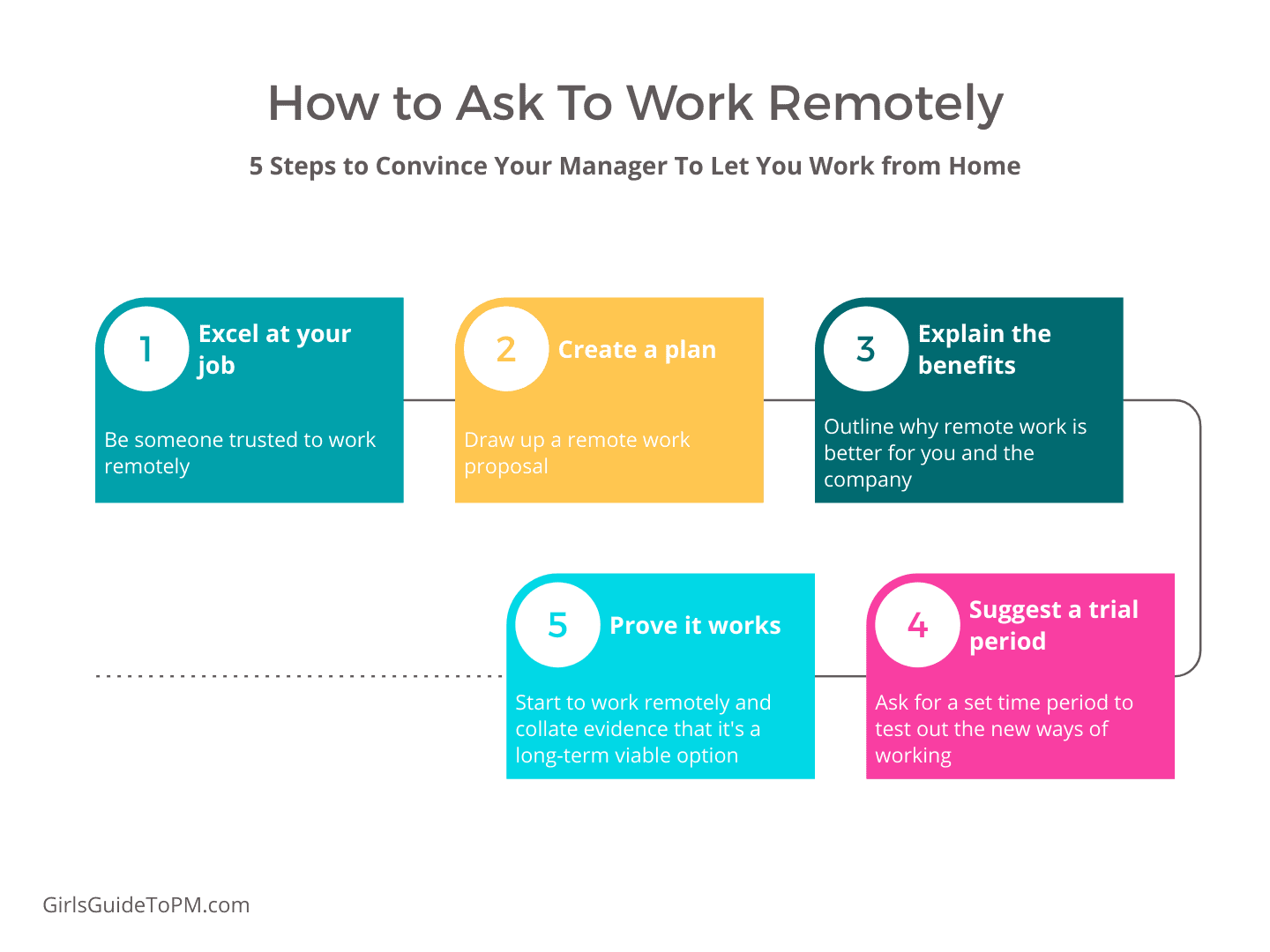How to ask for part-time hours
I have negotiated going part-time twice in my career: once successfully and once not successfully.
In this article I’ll share some tips on how to request part-time hours based on my experience of changing from full-time to part-time work.
Looking for advice on how to ask to work remotely? I’ve got you covered. Read my guide to asking your boss to let you work from home.
My switch from full-time to part-time hours (eventually)
I wanted to be part-time for many years, and back when I was a Six Sigma Black Belt at my old employer I put in my first request for part-time working.
In the UK, employers have to consider your request, but they don’t have to grant it. I would have been the only part-time person on the team, and I didn’t have children back then.
My request was refused.
There’s a huge cultural thing around working part-time. In my experience, it largely depends on how your manager feels about part-time staff. Do they believe the rest of the team have to pick up the slack? Do they feel it would be too difficult to arrange work for the team if you aren’t there some of the time?
I changed companies later (nothing to do with not getting part-time hours) and after my first child was born, I went back to work three days a week, and then eventually four. I had a (different) manager who was interested in ROWE working where results rather than hours, and who had children himself.
I can’t say that a manager who has children is more likely to grant part-time working hours requests, but someone who appreciates work/life balance, who models a good working culture where unpaid overtime is not expected (unlike what this research into overtime shows about US companies), and who values a results over hours of bums on seats is probably more open to the conversation.

What working part-time actually meant for me
However, back to the story.
When I moved to a 4-day working week, I did technically work five days a week. Fridays were my main writing and blogging days, where I draft emails to send to you, my lovely readers, met with my virtual assistant and generally got life admin stuff done. So I had (and still have) childcare organized for five days a week.
I wanted to go part-time because I wanted more time for writing project management books and doing the fun stuff. Basically, I wanted something outside of my day job — I wanted to spend more time on my side hustle and not feel that time was eating into the balance between work and family.
Whether you have a side job, want time with your family, or want to balance study or retraining with work, going part-time could be an option for you.
What happened was I ended up taking calls about my day job on a Friday because I was at my desk anyway.
On one project, the team meetings were set up for Fridays at 11am every week before I joined the team. When I took over the project management, the team wouldn’t budge from that time slot. I had to join the call weekly, take the meeting minutes, and to be honest I resented it.
Generally, though, working part-time worked for me. Sometimes I start work at 7.30am, other times I’m working until 10pm at night. Sometimes I take a long lunch break or go to the school for Stay and Play sessions.
Everything I need to get done gets done, and I’m lucky to have flexibility from my employer to make that happen.
I’ve lost track of the amount of people who have asked me for advice on going part-time as a project manager — or in any job (I also seem to speak to lawyers about this quite a lot!).
Here are some commonly asked questions.
“Can I work part-time?”
Yes. Well, at least technically you can. There are very few jobs that demand you to personally be available all week, although if you are CEO of an international corporation that’s going to be a hard role to job share.
Some customer-facing roles are not going to be easy to do part-time either, if someone needs to be on site to deal with customer queries. Consulting project management roles, or ones where you are permanently based at the client’s site for the duration of the project, area also going to be tricky.
However, there are options for job sharing. I’ve known several people who have job shared in senior roles. They have all been women, and I can count them all on the fingers of one hand. It’s not an easy route, but it is possible.
For middle management jobs, team leader jobs, project management roles, business analysis roles and many other jobs, whether you can work part-time or not relies on whether your company is open to helping you make it work.
Your employer may find it more palatable if you switch roles at the same time as going part-time, and it’s up to you to decide if that’s something you are open to doing.
“Can I switch from full-time to part-time?”
Yes! That’s what I did. I went from a full-time role to a four-day a week role.
Admittedly, I think that switch was easier because I had a period of maternity leave. I also had a period of time between my children being born when I was only working three days a week.
I do think it is easier to open up a conversation about part-time working when you come back from being off for any length of time, or are negotiating starting a new role with a new employer. Start thinking about what you would like your best outcome to be so when the time comes to return to work or take that new job, you are prepared to have the conversation.
You can also switch back again. Going part-time doesn’t mean you have to stay like that forever. When the season of life changes, you can move back into full-time working hours if you want, with your manager’s permission and support.
Chance are, they’ll be more than happy to have you back, and if not, you can start looking for an alternative role where you can do the hours you want.
“How do you negotiate going part-time?”
This is where we have to start having the conversation. Here’s what I’ve learned about part-time working in case you want to put forward an application yourself. Here’s how you start the negotiations!
It’s about your manager and your team.
If they can’t (or won’t) support you, you won’t be able to make it a success. How can you show your working time won’t have an impact on the team? Or if it will, demonstrate how it can be made manageable.
People care more about what it means for them than what it means for you.
It should be about results.
You should be judged on your contribution, not the hours you spend at the office. This goes for talking to your boss about flexible (i.e. work-from-home) working too. If you work in a results-orientated work place, then that is going to be a lot easier.
If your manager is someone who values presenteeism, your discussion will be more difficult.

Be clear about what part-time means.
I didn’t want to be a burden, and when I first started on four days a week I didn’t tell anyone that I wasn’t available on Fridays. I took meetings on Fridays because I didn’t want me being part-time to be ‘a thing.’ That gets tiresome quickly. Be clear about your availability.
Talk about how you will let people know when you are available, things like changing your out of office regularly to alert colleagues that you are not in the office. You can also put your working hours in your email signature so everyone has them clearly marked. I’m sure it won’t stop people ringing you on non-working days, but at least they’ll be able to see why you aren’t picking up.
Explain what your project teams will be able to do without you around. Talk about whether you are available for emergencies and if not what the back up plan is.
Now, I make sure my work balances out over the week. I do still do some work on a Friday but I make sure over the week I’m getting the time away from work. You might not be able to manage it flexibly like that, especially if you have to be in the office for work.
Start with an informal chat.
Talk informally about why you are considering part-time hours and what it would mean for the team. Ask what you need to do to make part-time working work for everyone. Don’t make your first step be an official request.
The point of this step is to help you understand how your manager feels about it, and what concerns they may have. You can then address their objections in detail in your formal request.
Ask clearly and follow policy.
Read the policy, and don’t assume your manager has. Ask formally for your request to be considered and be explicit about what ‘part-time’ means, listing the hours you are prepared to do.
Requesting to go part-time is best done in writing at this stage, so put together a letter that asks that you go from full-time to part-time in your current role. The letter should state:
- What you are requesting
- How you propose that would work in practice for you, your manager and your team
- A polite close that references the policy (if there is one) and asks what the next steps will be.
I don’t think you have to include the reason, but if you feel that would help get your request considered more seriously (for example, if your company has a policy of allowing part-time work for parental responsibilities), then put it in. If it is going to help your case, include it.
Be prepared to compromise if that helps you get closer to what you need. Think about whether you should ask for your perfect situation or the compromise situation first.
If your manager agrees to the perfect situation you’ll both be happy, and if they don’t you can move to discussing your next-best scenario.
Think about the other conditions of employment that will change.
For me, going part-time came with some other conditions. It’s not just about pay and hours. You might lose some influence at work, you might not be able to attend meetings other people attend as they happen on your day off and all that can have an overall negative impact on your career growth over time.
All that happened to me. It’s part of the price to pay for going part-time, and if your part-time reason is important enough to you, then it won’t matter so much. Because you’ll be getting the benefit of doing your side hustle, supporting your family and so on during your ‘off’ time, which will make it worth it.
You’ll have to live with it if you want to go part-time, because you can’t expect everyone else to put their work situations on hold for you. So be aware it’s a possibility.

“How do I convince my boss to let me go part-time?”
Consider what it’s going to mean to them. You need to be able to see it from their perspective.
How will you doing fewer hours impact on the team overall? Will the team’s deliverables be cut by a proportionate amount? Nope. They won’t. Every year people are asked to deliver more and more, and if you want one day off a week (for example) they aren’t going to get permission to recruit someone just to cover you for one day.
Someone else in the team is likely to have to pick up the slack, or the team is going to have to do the same with fewer working hours, or they will have to deliver less. But that isn’t your problem.
If there isn’t a job share in the future vision, then your manager is going to have to find a way to adapt the team’s deliverables to the amount of available resource — and that shouldn’t mean you doing overtime i.e. working on your day off.
We did a survey that shows people work 233 hours of unpaid overtime in a year, and I believe it’s worse if you are part-time because there’s pressure to work in other people’s normal working hours.
The positive is that the team’s wage bill will be cut proportionately, so that’s a pro you can put to your manager.
Create a proposal that works for you both
Ultimately you need to put forward a proposal that works for you both, and for your colleagues. You don’t want them to have to be picking up the slack while you are out of the office, because that just means they have to work harder because of your part-time hours.
Look for ways to make it workable and not a burden for everyone. For example, what meetings could go, what can you delegate? Could the saving in your salary be put towards something else?
Would you be open to considering compressed hours, where you work the ‘normal’ number of hours per week but over longer days so you get a day off? That can mean more stress and longer at your desk Monday to Thursday, but you get the time back on a Friday, for example.
Consider a job share
If you think your job can’t easily fit into part-time hours or be reduced appropriately, think about a job share. This is where two of you work the same position, and you have a handoff in the week so that the other person can pick up the work the first person started.
Job shares mean the employer gets a greater degree of coverage i.e. there is never a day when someone isn’t available to do work. And you get the share the burden.
I know a few people who job share and as long as you have the right partner, it can work out very well for everyone.
Point out the cost savings
If you work fewer hours, the company pays you less.
That might be a selling point for your boss, especially if you only plan to be part-time for a short period of time, for example while caring for an elderly relative or for a few years while your children are small.
They could replace you with a full-time person (if part-time hours are a deal-breaker for you and you’ll go elsewhere) but then they’ll have to fund the recruitment and onboarding of a new member of staff.
Think about flexible working
If you can’t get your boss on your side, think about other suggestions you can put forward that give you the flexibility you want.
For example, working compressed hours, flexible start and finish times or working from home (or more hours from home if you already do some of that). Flexible working still means you have to do the hours, but you could still find some way to do your side hustle or caring responsibilities if you had the option for compressed hours, for example.
You’ll be exhausted, but you could make it work, possibly.

Part-time working is awesome!
Putting aside the drop in salary, going part-time was the best thing I have ever done. It wasn’t without challenges, like people expecting me to be available all the time, and forgetting I was a part-timer, but overall, it gave me so much more freedom.
I’d love to hear your stories of requesting part-time working hours and the results. Come over to our friendly Facebook group and share your experiences!
Pin for later reading:

